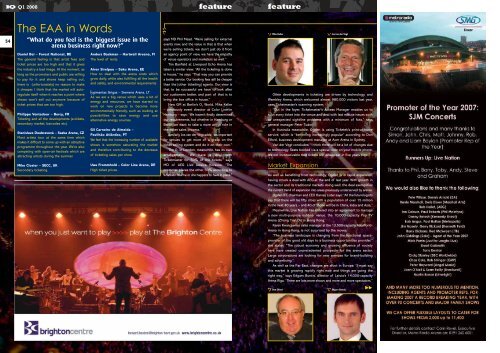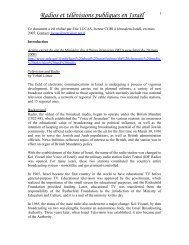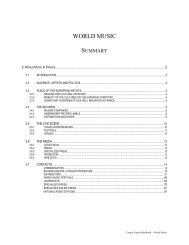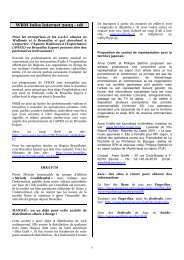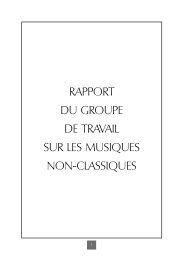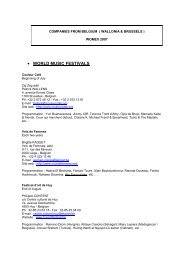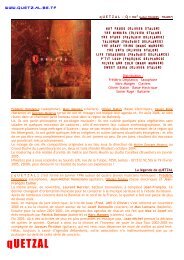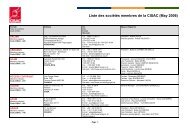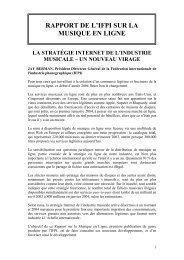Create successful ePaper yourself
Turn your PDF publications into a flip-book with our unique Google optimized e-Paper software.
Q1 2008featurefeature54The EAA in Words“What do you feel is the biggest issue in thearena business right now?”Daniel Bei – Forest National, BEThe general feeling is that artist fees andticket prices are too high and that it givesthe industry a bad image. At the moment, aslong as the promoters and public are willingto pay for it and shows keep selling out,there is (unfortunately) no reason to makeit cheaper. I think that the market will autoregulateitself when it reaches a point whereshows won't sell out anymore because ofticket prices that are too high.Philippe Ventadour – Bercy, FR<strong>Ticketing</strong> and all the developments (e-tickets,secondary market, barcodes etc).Stanislava Doubravová – Sazka Arena, CZMost artists tour at the same time whichmakes it difficult to come up with an attractiveprogramme throughout the year. We’re alsocompeting with open-air festivals which areattracting artists during the summer.Mike Closier – SECC, UK<strong>Secondary</strong> ticketing.Anders Backman – Hartwall Areena, FIThe level of rents.Aivar Sirelpuu – Saku Arena, EEHow to deal with the arena costs whichgrow daily, while also fulfilling all the healthand safety, and environmental requirements.Îygimantas Grigas – Siemens Arena, LTAs we are a big venue which uses a lot ofenergy and resources, we have started towork on new projects to become moreenvironmentally friendly, such as looking atpossibilities to save energy and usealternative energy sources.Gil Carneiro de Almeida –Pavilhão Atlântico, PTWe feel that the increasing number of availableshows is somehow saturating the marketand therefore contributing to the decreaseof ticketing sales per show.Uwe Frommhold – Color Line Arena, DEHigh ticket prices.says MD Phil Mead. “We’re selling for externalevents now, and the value in that is that whenwe’re selling tickets, we don’t just do it froman agency point of view, we have the empathyof venue operators and marketers as well.”Tim Banfield at Liverpool Echo Arena hastaken a similar view: “All the ticketing is donein house,” he says. “That way you can providea better service. Our booking fees will be cheaperthan the [other ticketing] agents. Our view isthat to be successful we have to look afterour customers better, and part of that is tobring the box office in house.”New GM at Berlin’s O 2 World, Mike Keller– previously event director at Color Line inHamburg – says: “We haven’t finally determinedour requirements, but whether in Hamburg orBerlin we want to take a more active role inthe ticket sales process.”Similarly, Jos van der Vegt adds: “It’s importantfor venues to get more of a grasp on theticket selling system and do it on their own.”The O 2 in London, meanwhile, has its ownarrangement. “We have a deal withTicketmaster for 50% of the tickets,” saysMD of AEG Live Jessica Koravos. “Thepromoter places the other 50% according towhatever deal he or she happens to have in place.”Mike KellerOther developments in ticketing are driven by technology, andWembley Arena, which welcomed almost 980,000 visitors last year,uses Ticketmaster’s scanning system.“Out in the foyer, Ticketmaster's Access Manager enables us toscan every ticket into the venue and deal with last minute issues suchas unexpected sightline problems with a minimum of fuss,” saysgeneral manager Peter Tudor.In Australia meanwhile, Ogden is using Ticketek's print-at-homeservice, which is “becoming increasingly popular” according to DonElford, business development manager at Acer Arena in Sydney.Van der Vegt concludes: “I think there will be a lot of changes dueto technology. Seats booked via a special code on your mobile phone.It’s not inconceivable that tickets will disappear in five years time.”Market ExpansionJos van der VegtAs well as benefiting from technology, Ogden is in rapid expansion,having struck a deal with AEG at the end of last year. With growth inthe sector and its traditional markets doing well, the deal exemplifiesthe current trend of expansion into areas previously underserved by arenas.Ogden IFC chairman and CEO Harvey Lister says: “All the futurologistssay that there will be fifty cities with a population of over 15 millionin the next 40 years – and 40 of those will be in China, India and Asia.”Meanwhile, Live Nation has entered into an agreement to managea new multi-purpose outdoor venue, the 10,000-capacity Pop TVArena (Zhong Tian Di) in Hong Kong.Karen Kwan, senior sales manager at the 13,500-capacity AsiaWorld-Arena in Hong Kong, is not surprised by the moves.“The business landscape is changing from the functional spaceproviderof the good old days to a business opportunities provider,”she states. “The robust economy and growing affluence of societyhere have created unprecedented prospects for the arena sector.Large corporations are looking for new avenues for brand-buildingand advertising.”As well as the Far East, changes are afoot in Europe. “I must saythis market is growing rapidly right now and things are going theright way,” says Edgars Buncis, director of Latvia’s 14,000-capacityArena Riga. “There are lots more shows and more and more spectators.”Don ElfordEdgars Buncis


